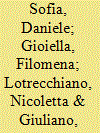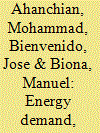| Srl | Item |
| 1 |
ID:
171427


|
|
|
|
|
| Summary/Abstract |
Mitigation strategies towards progressive decarbonization of the energy system are a valid approach to slow environmental pollution yielding social benefits, as established from National Energy and Climate Plan (NECP). The first objective is the increase of energy efficiency within 2030 by promoting the use of renewable energy and the electrification of consumption in other sectors (household and transport). Cost-benefit analysis (CBA) is an analytical tool to evaluate investments and support policy decisions for society's welfare. The paper aims to assess how CBA can be used to quantify the costs and related social benefits in different sectors (energy, transport and household) if the decarbonization scenario is applied in Italy in 2030. Overall, our findings show positive benefits obtained with the adoption of different mitigation strategies for all sectors. These results can provide significant support to decision-makers in the implementation of decarbonization scenario in Italy scheduled for 2030.
|
|
|
|
|
|
|
|
|
|
|
|
|
|
|
|
| 2 |
ID:
128046


|
|
|
|
|
| Publication |
2014.
|
| Summary/Abstract |
Transportation contributes to resource depletion and has other negative impacts on the environment. The present study presents models of energy demand and environmental emissions for the land transportation sector in Metro Manila, Philippines from 2010 to 2040 using the "Long Range Energy Alternatives Planning (LEAP)" tool. The study projected energy demand and CO2, CO, HC, NOx and PM10 emissions for Business-As-Usual (BAU) and alternative scenarios and compared the results while aiming to determine optimal transportation policies to reduce energy demand and emissions. The results indicated that the adoption of EURO 4 emission standards provides the greatest reduction in energy use at 10.8%, while the best cases for the various gas emissions were split among different options. In addition, a combination of all of the alternatives is expected to lower energy use by 27.8% and to reduce CO2, CO, HC, NOx and PM10 by 30.3%, 60.3%, 59.0%, 48.2% and 66.4%, respectively. The analytical framework employed herein could be applied to other cities to evaluate and prioritize strategies to reduce future energy requirements and emissions.
|
|
|
|
|
|
|
|
|
|
|
|
|
|
|
|